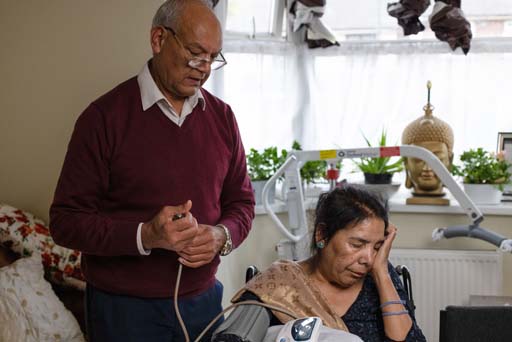3.8 Anxiety
Some people with Parkinson’s experience feelings of anxiety. These can be intense, especially if their physical symptoms aren’t under control.
Anxiety is a feeling that everyone feels from time to time. It is a natural reaction to a dangerous or threatening situation. It disappears when the situation changes, if we get used to the situation, or if we leave the situation. But some people become anxious for long periods of time.
Symptoms of anxiety include worrying too much, difficulties concentrating or feeling tense. Some people may experience physical symptoms too, including sweating, dizziness, heart palpitations and nausea.
Severe anxiety can sometimes interfere with day-to-day life. At this point, anxiety is no longer a ‘normal’ reaction and may be considered as a mental health issue. A person with severe anxiety may also have symptoms of depression. Treating the depression can sometimes clear up the anxiety symptoms and vice versa.
Because anxiety can have physical symptoms, it may be difficult for people to tell the difference between symptoms of anxiety and the symptoms of Parkinson’s. Some people with Parkinson’s have anxiety related to the ‘on/off’ state of their motor symptoms. When ‘off’ and less able to move well, they may develop significant anxiety symptoms. When a person takes their medication, their symptoms may improve.
Physical symptoms
When anxiety is related to their physical symptoms, whether that’s a fear of falling or freezing, or being unable to communicate, people may develop panic attacks. This is something that many people find very difficult to manage.
Some people may find that when their physical symptoms are better controlled by medication, their anxiety improves. So it is important that the physical symptoms are managed effectively. If you think your client needs a review of their medication, make an appointment (or suggest that they should make an appointment) with their specialist or Parkinson’s nurse.
When their drugs are wearing off, people with Parkinson’s might feel anxious, depressed or hopeless. After they’ve taken their medication, their mood may lift again.
Look for patterns in their anxiety episodes.
It is important to be able to recognise the symptoms of anxiety, so that they can be treated appropriately.
Treating anxiety
In the majority of cases, anxiety can be treated. For mild and occasional anxiety, identifying and avoiding triggers of anxious episodes and avoiding stimulants (tea, coffee and alcohol), especially late in the evening, can help. Where appropriate, exercise can also help to combat stress and relieve anxiety.
Complementary therapies, changes to Parkinson’s medication, counselling, cognitive behavioural therapy and medication for anxiety may also be helpful.
Anxiety can be a very difficult problem to live with and it may make it more difficult for someone to take part in normal day-to-day activities, such as going out or socialising.
Encourage the person with Parkinson’s to talk about their anxiety with you, as this may help you to understand how they are feeling. Knowing what they are going through may help you to be more patient in helping someone to manage their anxiety.
If you notice that the symptoms of anxiety are having a big effect on the quality of life of someone with Parkinson’s, report it to your manager or suggest that they see their GP, specialist or Parkinson’s nurse. They may be referred to a mental health specialist who can recommend treatment.
Find out more in the Parkinson’s UK information sheet on anxiety [Tip: hold Ctrl and click a link to open it in a new tab. (Hide tip)] .
Actions to take
- For mild anxiety it may be helpful to encourage the person to avoid stimulants such as caffeine and alcohol.
- Help the person to identify what triggers an anxious episode.
- Make sure that the person you are caring for has had a medical review to ensure their Parkinson’s medication is as effective as it can be.
- Some people find that relaxation exercises, such as yoga or massage, can be helpful in relieving symptoms of anxiety.
3.7 Depression

